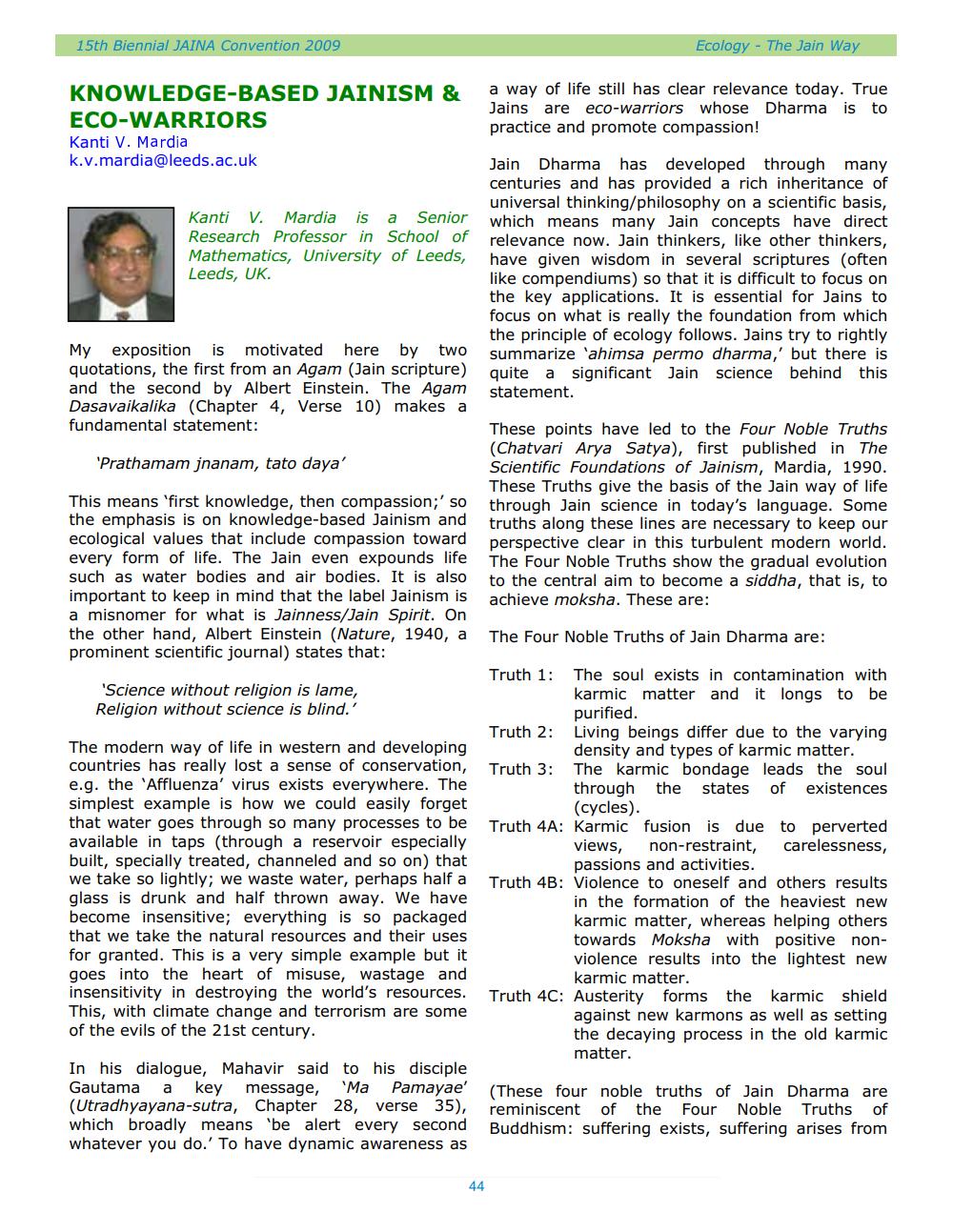________________
15th Biennial JAINA Convention 2009
Ecology - The Jain Way
KNOWLEDGE-BASED JA ECO-WARRIORS Kanti V. Mardia
[email protected]
a way of life still has clear relevance today. True Jains are eco-warriors whose Dharma is to practice and promote compassion!
Kanti V. Mardia is a Senior Research Professor in School of Mathematics, University of Leeds, Leeds, UK.
Jain Dharma has developed through many centuries and has provided a rich inheritance of universal thinking/philosophy on a scientific basis, which means many Jain concepts have direct relevance now. Jain thinkers, like other thinkers, have given wisdom in several scriptures (often like compendiums) so that it is difficult to focus on the key applications. It is essential for Jains to focus on what is really the foundation from which the principle of ecology follows. Jains try to rightly summarize ahimsa permo dharma,' but there is quite a significant Jain science behind this statement.
My exposition is motivated here by two quotations, the first from an Agam (Jain scripture) and the second by Albert Einstein. The Agam Dasavalkalika (Chapter 4, Verse 10) makes a fundamental statement:
'Prathamam jnanam, tato daya'
This means 'first knowledge, then compassion;' so the emphasis is on knowledge-based Jainism and ecological values that include compassion toward every form of life. The Jain even expounds life such as water bodies and air bodies. It is also important to keep in mind that the label Jainism is a misnomer for what is Jainness/Jain Spirit. On the other hand, Albert Einstein (Nature, 1940, a prominent scientific journal) states that:
These points have led to the Four Noble Truths (Chatvari Arya Satya), first published in The Scientific Foundations of Jainism, Mardia, 1990. These Truths give the basis of the Jain way of life through Jain science in today's language. Some truths along these lines are necessary to keep our perspective clear in this turbulent modern world. The Four Noble Truths show the gradual evolution The Four Noble Truths to the central aim to become a siddha, that is, to achieve moksha. These are:
The Four Noble Truths of Jain Dharma are:
'Science without religion is lame, Religion without science is blind.'
The modern way of life in western and developing countries has really lost a sense of conservation, e.g. the 'Affluenza' virus exists everywhere. The simplest example is how we could easily forget that water goes through so many processes to be available in taps (through a reservoir especially built, specially treated, channeled and so on) that we take so lightly; we waste water, perhaps half a glass is drunk and half thrown away. We have become insensitive; everything is so packaged that we take the natural resources and their uses for granted. This is a very simple example but it goes into the heart of misuse, wastage and insensitivity in destroying the world's resources. This, with climate change and terrorism are some of the evils of the 21st century.
Truth 1: The soul exists in contamination with
karmic matter and it longs to be
purified. Truth 2: Living beings differ due to the varying
density and types of karmic matter. Truth 3: The karmic bondage leads the soul
through the states of existences
(cycles). Truth 4A: Karmic fusion is due to perverted
views, non-restraint, carelessness,
passions and activities. Truth 4B: Violence to oneself and others results
in the formation of the heaviest new karmic matter, whereas helping others towards Moksha with positive nonviolence results into the lightest new
karmic matter. Truth 4C: Austerity forms the karmic shield
against new karmons as well as setting the decaying process in the old karmic matter.
In his dialogue, Mahavir said to his disciple Gautama a key message, Ma Pamayae' (Utradhyayana-sutra, Chapter 28, verse 35), which broadly means 'be alert every second whatever you do.' To have dynamic awareness as
(These four noble truths of Jain Dharma are reminiscent of the Four Noble Truths of Buddhism: suffering exists, suffering arises from




